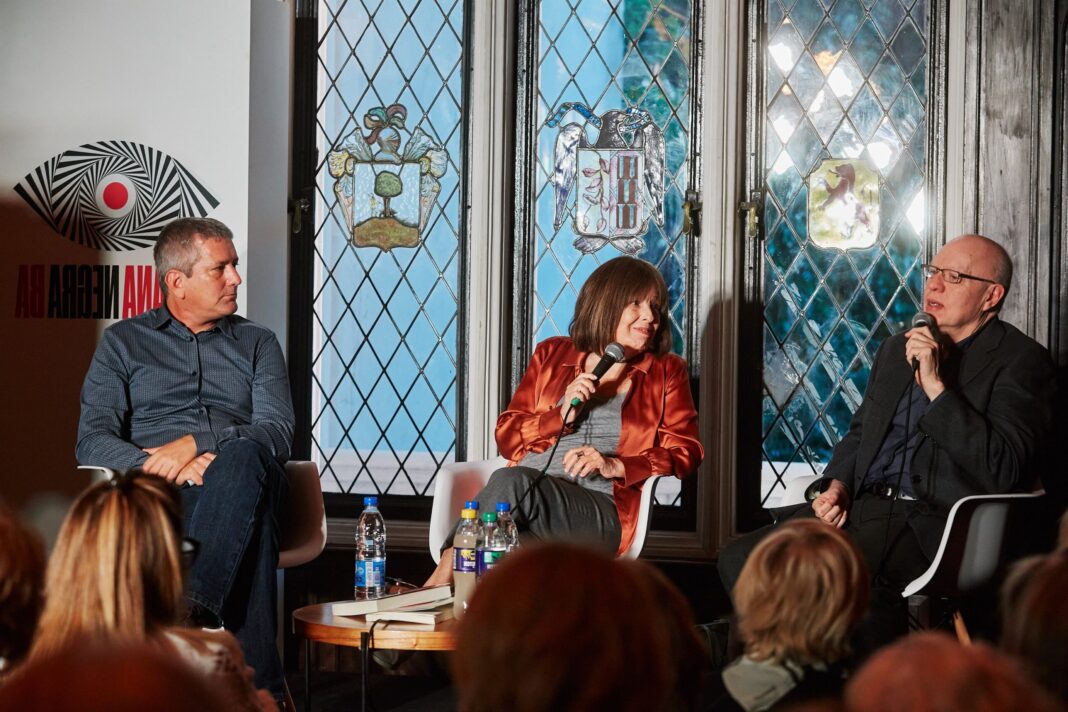Buenos Aires — The sun was setting, casting long shadows over the cobblestone streets of Buenos Aires, but inside the Biblioteca Güiraldes, the room was buzzing with the kind of energy only a truly passionate debate can spark. Authors Jorge Fernández Díaz and Santiago Roncagliolo sat on a dimly lit stage, discussing the art of crime fiction, their voices weaving through the air like threads of mystery in a well-crafted noir novel. There’s something about crime fiction that grips the human soul—especially in Latin America, where the line between law and lawlessness often blurs, creating stories as raw as they are riveting.
The Latin American Lens on Crime Fiction: Where Reality Meets Fiction
Crime fiction, or novela negra, has always been a reflection of societal fears, and in Latin America, these fears run deep. Santiago Roncagliolo, author of The Accident, reminds us that crime fiction isn’t just about solving murders or uncovering hidden motives. In his world, the criminals aren’t always lurking in the dark alleys of Lima—they’re often seated in the halls of power, making decisions that alter the course of a nation. “The mafias have replaced the state,” he says with a quiet but certain conviction, his words echoing the unspoken realities many face daily in Latin America.
For readers searching for stories that go beyond the surface-level thrill of a whodunit, Latin American crime fiction offers something more—a visceral connection to real-life struggles, where the state itself can be the enemy. This genre thrives on a tension that is as much about survival as it is about justice. Readers don’t just want to know who did it—they want to understand why.
The Evolution of the Detective: From Machismo to Vulnerability
It’s no coincidence that authors like Jorge Fernández Díaz have shifted from creating tough, often morally ambiguous male detectives to writing about women like Cora Bruno in his latest novel Cora. In Latin America, where patriarchy still casts a long shadow, Díaz’s decision to introduce a female detective speaks volumes. “Cora Bruno is tough, but she’s also vulnerable. She’s not just chasing criminals—she’s chasing her own demons,” Díaz explains, offering a rare glimpse into the complexity of his protagonist.
For a long time, detectives in fiction were portrayed as lone wolves—stoic, often emotionally detached. But today, there’s a growing demand for characters who feel more human. Crime fiction fans don’t just want a hero—they want someone they can relate to. Someone who, like them, is navigating a world full of contradictions. And this shift is particularly powerful in the context of Latin America, where systemic corruption often places citizens in moral gray zones.
Why Borges Placed Detective Fiction at the Center of Latin American Literature
Jorge Luis Borges, the literary giant whose presence still looms large over Argentinian literature, did more than write stories that confused and delighted readers—he revolutionized the role of crime fiction in the literary canon. “Borges put the detective story at the heart of serious literature,” said Fernández Díaz during the conversation, highlighting how Borges elevated the genre from pulp fiction to something worthy of academic study. He transformed detective fiction into an intellectual puzzle, a mirror for society’s deepest fears and a commentary on the elusiveness of truth itself.
It’s no wonder that contemporary Latin American authors like Roncagliolo and Díaz continue to follow in his footsteps, blending the intrigue of a crime thriller with the philosophical weight of existential questions. In a region where truth is often obscured by layers of corruption, crime fiction offers a way to dig beneath the surface.
Crime Fiction: The Audiobook Revolution and New Narratives
Roncagliolo, who now resides in Spain, revealed that his latest novel started as an audiobook—a format still emerging in Latin America but widely popular in other parts of the world. “There’s something intimate about listening to a story unfold in your ears,” he explained. In many ways, it mirrors the very essence of crime fiction—whispered secrets, hushed voices, and the slow reveal of truth. The audiobook format allows for a new kind of storytelling, one where the listener becomes the detective, piecing together the clues as they listen.
This shift towards serialized audiobooks is a testament to how technology is reshaping not just how we consume stories, but how they’re told. And for crime fiction—where every pause, every moment of tension matters—this format may just be the perfect match.
Why Crime Fiction Thrives in Latin America: Reflection of Reality
In countries where justice can seem elusive and where political leaders often resemble the villains in noir films, crime fiction serves as more than just entertainment—it becomes a form of resistance, a way of making sense of a world that often feels senseless. Roncagliolo doesn’t shy away from this idea. “In Latin America, we elect our villains,” he says with a smirk, knowing full well that his words hit close to home for many in the audience.
But it’s not just about electing villains—it’s about survival. Crime fiction thrives in Latin America because it mirrors the lived experience of its people. Corruption, betrayal, and violence aren’t just plot devices—they’re everyday realities. This is why Latin American noir feels so raw, so visceral—it’s born out of a truth that’s often stranger, and certainly darker, than fiction.
Final Reflection: The Power of Crime Fiction in Latin America
As the conversation at the Biblioteca Güiraldes wound down, it became clear that Latin American crime fiction isn’t just thriving—it’s evolving. From the intellectual puzzles of Borges to the gritty realities of Díaz and Roncagliolo, this genre continues to push boundaries, not just within literature, but within society itself. Crime fiction doesn’t just entertain—it confronts us with the uncomfortable truths we’d often rather ignore. In a world where the lines between hero and villain are increasingly blurred, these stories remind us that the real mystery is not just in solving the crime, but in understanding the human heart.


